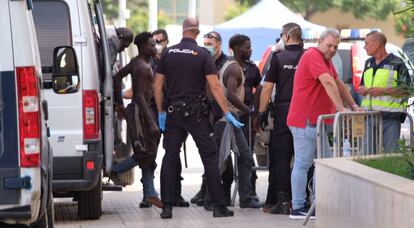Migrant dies during mass border crossing in Spanish city of Melilla
Nearly 30 people were injured and three remain hospitalized after hundreds jumped the fence dividing Morocco from the North African exclave

A migrant from Sub-Saharan Africa died on Sunday when around 300 people tried to jump the border fence dividing Morocco from the Spanish exclave city of Melilla in North Africa. According to the central government’s delegate in Melilla, Sabrina Moh, 26 migrants were injured in the attempt and three remain hospitalized. Nine Civil Guard officers were also injured in the crossing. Of the 300 people who attempted the crossing, 233 made it into the exclave city, the government reported.
“Blood on the fence.”
The border jump took place at 9am at one of the highest points in Melilla. A witness in the area, which is used as a recreational and camping ground by locals, said emergency services tried unsuccessfully to resuscitate the migrant. The central government delegation said the man died from a heart attack but an autopsy is yet to be completed. Three badly injured migrants were with the body when it was found.
One of them had the muscles in his arms completely torn apart
Local grocery store owner in Melilla
An hour after the jump at around 10am, the group of migrants walked from Rostrogordo at the edge of Melilla to the Temporary Immigration Detention Center (CETI), accompanied by a police patrol and various ambulances, locals in nearby El Poblado neighborhood told EL PAÍS.
“Some of them were shattered,” said a grocery store owner, who offered them bottles of water. “One of them had the muscles in his arms completely torn apart.”
A second group of migrants tried to cross the border at the same spot around 2.30pm but only one made it into the city.
“The fence after the jump.”
Following the death, Spanish Prime Minister Pedro Sánchez, of the Socialist Party (PSOE), wrote on Twitter: “The government will always support a coordinated and European solution to the migrant challenge. My solidarity with and recognition of the professionalism of the State Security Forces and the services who work at our borders.”
No signs of violence
The 223 migrants who made it into Melilla were taken immediately to the CETI where they were processed before being taken to a National Police station. The migrants left the police vans in pairs, some with their hands tied together. According to police sources, between 10 and 15 may be minors. After they left the station, the group was taken back to the CETI where a lawyer was waiting to assist them.
Fears of “express deportation”
A number of human rights organizations have expressed concern that the Spanish government will try to deport the migrants back to Morocco instead of them being processed first in Spain. The government used this process, known as "express deportation," to send back 116 Sub-Saharan migrants who violently stormed into Ceuta in August. For this to happen, the government would need to reactivate an agreement signed with Morocco in 1992 – a measure that is rarely applied in cases of border jumps. This agreement is more typically used to return migrants from other countries who are intercepted on Spanish shores near the Moroccan coast.
The injured migrants were taken to Comarcal Hospital, which had activated a special emergency unit to deal with the wounded. Of the 26 injured, 19 had various cuts and fractures. Six Civil Guard officers were also taken to hospital for injuries caused by hooks – used by the migrants to scale the fence – and minor blows.
This is the second mass border crossing to take place this year in Melilla. In January, 209 people jumped the fence into the exclave city but since then, there have been only minor or solo attempts to enter Melilla. The drop in border jumps indicates that more migrants are choosing to take the sea route into Europe via cities like Alhucemas and Nador.
In Ceuta, the other Spanish exclave city in North Africa, two migrants were found dead next to the border fence in April. Police said that at least one had died from a heart attack, given there were no visible signs of violence. Migrants waiting to cross the border live in terrible conditions, often spending days without food or water, which weakens their physical condition.
English version by Melissa Kitson.
Tu suscripción se está usando en otro dispositivo
¿Quieres añadir otro usuario a tu suscripción?
Si continúas leyendo en este dispositivo, no se podrá leer en el otro.
FlechaTu suscripción se está usando en otro dispositivo y solo puedes acceder a EL PAÍS desde un dispositivo a la vez.
Si quieres compartir tu cuenta, cambia tu suscripción a la modalidad Premium, así podrás añadir otro usuario. Cada uno accederá con su propia cuenta de email, lo que os permitirá personalizar vuestra experiencia en EL PAÍS.
¿Tienes una suscripción de empresa? Accede aquí para contratar más cuentas.
En el caso de no saber quién está usando tu cuenta, te recomendamos cambiar tu contraseña aquí.
Si decides continuar compartiendo tu cuenta, este mensaje se mostrará en tu dispositivo y en el de la otra persona que está usando tu cuenta de forma indefinida, afectando a tu experiencia de lectura. Puedes consultar aquí los términos y condiciones de la suscripción digital.








































